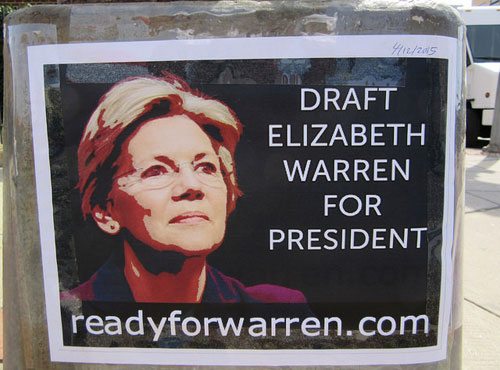
August 28, 2017; CNN
Many have noticed that Elizabeth Warren has been increasingly speaking to the racism that magnifies the country’s economic challenges for people of color, and some are noting that this is the same intersection of issues that Martin Luther King highlighted before his death in 1968. CNN’s Eric Bradner tracked Warren’s evolving stance and identified her attempt to read Coretta Scott King’s 1986 letter condemning Jeff Sessions—which gave us the memorable “nevertheless, she persisted”—as the start of her broadening appeal.
Warren has also been deepening her relationships with leaders of color, including Bernice King, the daughter of Martin Luther King, Jr and Coretta Scott King, who said, “In order for us to make effective change, leaders have to be courageous. They have to be willing to take a stance…willing to lose some things. And she was willing to risk some things in this process, being silenced on the floor.”
Massachusetts elected Warren to the U.S. Senate in 2012, and she has since become known for her battle with Wall Street and big banks. She has repeatedly noted that while the U.S. economy is in an upturn, things are not good for poor people and people of color.
Warren, who is known for her passionate speeches, has delivered a series over the last few months emphasizing issues of race and culture in the U.S. In April, she spoke at the NAACP’s 62nd annual Fight for Freedom dinner with over 5,000 attendees and an overall theme about voting in the next presidential election. In July, she spoke at a Rainbow PUSH Coalition event of Black women from Chicago and across the world focused on women’s empowerment. She also spoke that month at the Netroots Nation meeting of about 3,000 in Atlanta, where she urged Democrats “to reject centrist policies and move leftward.” In this speech, she declared a progressive takeover of the party and proposed “Medicare for all, debt-free college or technical school, universal pre-kindergarten, a $15-an-hour minimum wage and portable benefits.”
Bradner observed, “The speeches have stoked speculation that Warren is angling to run for president in 2020.” Michael Curry, former president of the Boston chapter of the NAACP and current chair of the national’s advocacy and policy committee, said, “People take about her in presidential terms often when I travel the country, and I think in the African American community, it’s because they appreciate that she, in a very full-throated way, will speak to the issue of racism.”
Vermont Sen. Bernie Sanders attempted to appeal to the same set of voters, but some have said that he was unable to relate to Blacks. In contrast, Rev. Jesse Jackson said, “Warren represents a more diverse state, and ‘she does not talk with a strain; she talks with a comfort level and familiarity’ in speaking with black leaders.” He also noted that the issues that Warren speaks to affect both “whites in Appalachia and blacks in the Delta.”
Sign up for our free newsletters
Subscribe to NPQ's newsletters to have our top stories delivered directly to your inbox.
By signing up, you agree to our privacy policy and terms of use, and to receive messages from NPQ and our partners.
Bradner wrote, “Since the 2016 election, an emerging divide within the Democratic Party is between those on the left who prefer the message of all economic populism, all the time, and liberals who see issues of race, gender, sexual orientation, religion and other identity issues as central.”
Warren said, “In the wake of the last election, I’ve heard people say we need to decide whether we’re the party of the white working class or the party of Black Lives Matter,” and she aims to bridge that perceived divide. In a statement to CNN, she wrote,
“Divide and conquer” is an old story in America—the idea that whatever worries you, the answer is to blame others who don’t look or talk or worship like you do. But when we turn on each other, we can’t unite to fight back against a rigged system. President Trump’s divisive actions don’t reflect our values. We need to say so—and we need to keep fighting every single day to help build opportunity for every single American.
Black leaders in Boston who have worked with her over the last few years speak of her eagerness to address issues that affect people of color. Boston City Councilor Ayanna Pressley, who has worked with Warren on predatory business practices at for-profit colleges and access for people of color to the growing cannabis industry, said, “What you’re seeing on the national stage is what I’ve seen many times in intimate rooms and spaces with Sen. Warren…She does not marginalize the community. She sees an African American in their totality…She is inclusive. So, I don’t only get a call to come sit at a table about an issue that is disproportionately impacting communities of color. I’m invited into any room where she believes that my office…or my lens could add value.”
Curry summed it up when he said, “I saw in her speech an intentionality to speak to our communities—to say, ‘I’m here for you, and I plan to be a champion on the issues you care about.’”—Cyndi Suarez
Correction: This article has been changed from its initial form to correct the spelling of Dr. King’s widow’s name.













